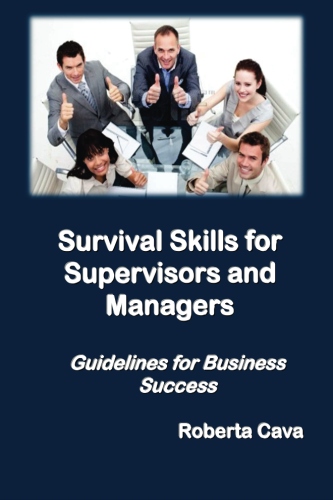HAVE A HAPPY HOLIDAY SEASON
Last month we discussed Roberta Cava’s ten books that are now available in Hardcover on Amazon Books. This month we will discuss her book Survival Skills for Supervisors and Managers – Guidelines for business success.

Here is the table of contents:
Introduction
Chapter 1 – The Role of the Supervisor / Manager
- What is a supervisor/manager?
- Qualities of a good supervisor
- Why supervisors/managers fail
- Role of the supervisor/manager
- The person in the middle
- Responsibility
- Authority
- Accountability
- My role as a supervisor
- Supervising former peers
- Socialising with your staff
Chapter 2 – Leadership Styles
- Leadership
- Use of leadership skills
- Good leadership
- Bad leadership
- Leadership styles
- What is your leadership style?
- Theory Y vs. Theory X
- Getting to know your staff
- Leadership behaviour
- Alternative leadership approaches
Chapter 3 – Delegation
- Delegation
- Excuses for non-delegation
- Risks of delegation
- The delegation process
- Delegation Do’s and Don’t’s
- Sample delegation problems
- Demotions
- Standards of performance
- Position descriptions
- Knowing your employees better
- Analysing your job
- How much do you delegate?
Chapter 4 – Motivation
- Motivation
- What motivates most employees?
- Maslow’s Hierarchy of Needs
- Altruism
- The need Hierarchy at work
- Herzberg’s Theory
- Problem employees
- Understanding frustration
- Common ways we see anger expressed at work
- Keeping an employee’s desire to contribute
- Performance appraisals
- How often should performance appraisals be done?
- Pet employees
- Job enrichment/enlargement
- How do you motivate your staff?
Chapter 5 – Time Management
- The Busy man
- Areas of life
- Principles of time management
- Time log
- Bottlenecks
- Different kinds of tasks
- Swiss cheese approach
- Complex long-term assignment
- How to choose priorities
- Bring forward file
- The in-basket
- Reward vs. punishment
- Daytimers and “to do” lists
- Solutions to time wasters
- How to manage interruptions
- How to prevent interruptions
- Are you at fault?
- How to control crisis
- Assistant’s suggestions to bosses
- Procrastination
- Five types of procrastinators
- Lateness
- How much time do we have?
- Time breakdown
Chapter 6 – Interpersonal Skills
- How to listen
- Tune outs
- Blocks to effective listening
- How do you rate as a listener?
- Improve your listening skills
- Qualities of a good listener
- How do you rate as a speaker?
- Communication tips
- The communication process
- Message loss through repetition
- Communication process
- How to avoid being misunderstood
- Skill of paraphrasing
- Skill of feedback
- Process of feedback
- Feedback steps
- Non-verbal communication
- Space bubbles
- Territory
- Physical clues
- Employee’s body language
Chapter 7 – Problem Solving and Decision-Making
- Three criteria required for problem solving
- Sample problem
- Dealing with your own problems
- Problem solving and decision-making guide
- Driving and restraining forces
- Brainstorming
- Planning for problem solving
- The importance of planning
- Planning factors
- Jobs skills inventory chart
- The change process
- Meeting objections head-on
- Making change happen
- Conflict resolution
- Creative problem solving
Chapter 8 – Training and Development
- Qualities of a good trainer
- Teaching adults
- Characteristics of adult learners
- Differences in adult/child learners
- Learning process
- How to ‘lock in’ training
- One-on-one training
- Determining training needs
- Testing abilities of employees
- Dimensions tested
- Manpower planning
- Training needs of supervisors
- Learning a new skill
- Training of others
- Retention of information
- Training vs. development
- Career development
- Training procedure
- Tangible/intangible behaviour
- Setting objectives
- Sample objectives
- Identifying costs of training
- Methods of instruction
- Methods I use
- Preparing for a seminar/workshop
- Group vs. individual activities
- Technical vs. life skills
- Theoretical vs. practical training
- Bridging
- Timing of training segments
- Use of training aids
- Re-enforcement of training
- How to keep participants motivated
- Instructor’s apparel
- Presentation skills
Chapter 9 – Meeting Skills
- Conducting meetings
- Role of the chairperson
- Planning a meeting
- Using and developing group’s unique talents and abilities
- Overcoming cultural or personality differences
- Evaluate
- Follow-up
- Preparing for a meeting
- Avoiding planning blunders
- The use of questions at meetings
- How to chair a meeting
- Types of meetings
- Meeting traps
- Problem participants
Conclusion – Putting it all together
Career Counselling
Performance Appraisals
Bibliography
Roberta Cava has written 70 books and will be writing more. She lives on the Gold Coast of Queensland, Australia.
To order her books:
Go to amazon.com then click ‘Books’ and under ‘search’ put ‘Roberta Cava’ (which will bring up all of her books).
To contact Roberta Cava or Cava Consulting, please send an e-mail to cavaconsulting@ozemail.com.au
